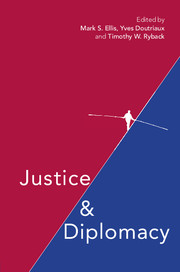 Justice and Diplomacy
Justice and Diplomacy 2 - Legal Expertise
Implications of Legal Terminology in Diplomatic Processes
Published online by Cambridge University Press: 16 February 2018
Summary
- Type
- Chapter
- Information
- Justice and DiplomacyResolving Contradictions in Diplomatic Practice and International Humanitarian Law, pp. 20 - 38Publisher: Cambridge University PressPrint publication year: 2018
